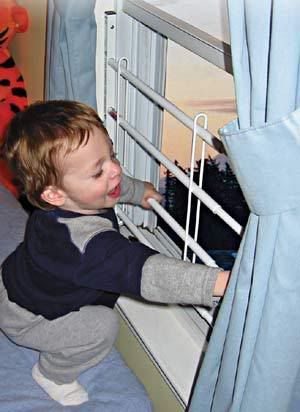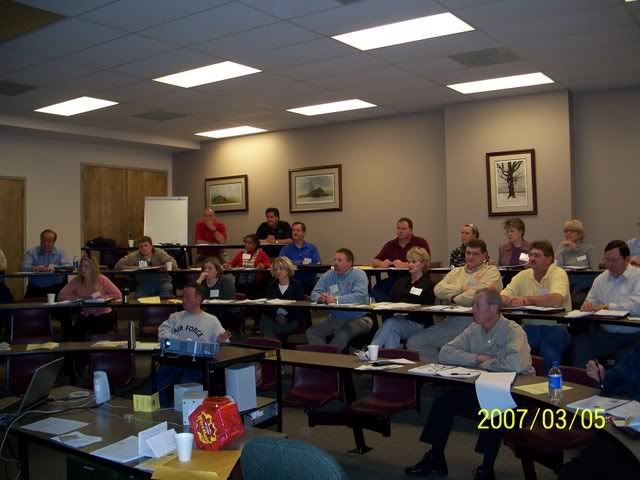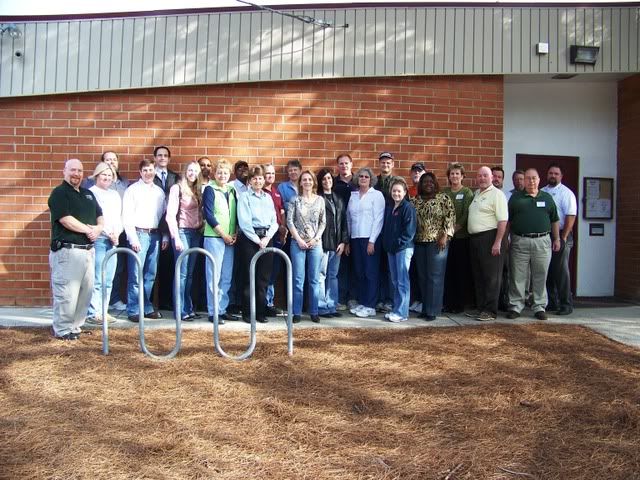Greetings
Friends in the Name of Safety:
Whew! One month down and
eleven to go. With economic stress, unknown
financial times, and job security issues
ahead, safety professionals are struggling
to keep our heads above water. As we
continue to seek ways to help keep our
employees safe and save our employers bucks,
we're always looking for new ideas to get
the job done. Help is not too far away!
Mark your calendars and tell your boss the
good news. The
79th Annual Statewide Safety Conference
will be held May 12 - 15, 2008 at the Joseph
Koury Convention Center in Greensboro, NC.
There's no better way to gain knowledge at a
affordable cost...ZERO REGISTRATION! This
year promises to be another great conference
with quality speakers and great topics. Our
VENDORS will be there in full force to
provide you with new ideas and products too!
Travel is being cut back by everyone, but
this is a conference you will not want to
miss. The theme this year is "SAFETY - A
NEW YEAR!" Come for one day or stay for the
entire conference. For those needing WATER
& WASTEWATER CREDIT HOURS, Tuesday is the
day! You can get all six of your critical
hours at no cost.
We have moved the
SAFETY TALK CONTEST to Wednesday morning
this year to help you get more value for the
day as well. NETWORKING is always rewarding
at our Vendor sponsored Reception Wednesday
evening from 5:00 p.m. until 7:30 p.m.
Thursday will have a great EXECUTIVE SESSION
plus many topics during the afternoon to
peak your interest. By the way, the GRAND
PRIZE drawing sponsored by our VENDORS
promises to be awesome again this year. To
be eligible to win, you will need to visit
each booth and have the vendors sign your
card.
You won't want to miss Friday morning to
hear what OSHA has to say either.
By
CLICKING HERE you can pre-register for
the conference and download and
PRINT the program to show your boss why
they can't afford not to send you to this
conference this year. There's no better way
to face the challenges of 2009!
We look forward to a great conference and
hope to see you there!
|
But What Can
I do?

The other day I heard one of our
company's employees ask "What can I
do about accident prevention, since
I only work here?" Well, we all work
here, and presumably we all want our
worksite to be as safe and healthful
as possible. That won't happen,
though, if we pass the buck.
In reality there's a great deal that
every one of us can do about
accident prevention. It has to do
with being continuously alert to
possible hazards and following safe
work practices and procedures-just
the sort of thing we discuss in
these talks.
Here are just 10
guidelines to "what I can do"
and what each of us can do:
1. Know your job.
Follow all instructions, and if you
are not sure of exactly how to carry
out an assigned operation, ask your
foreman before you begin.
2. Use tools properly.
Select the right ones-the ones
designed for the job. Be sure
they're in good condition. Put them
away when you finish.
3. Practice good
housekeeping. Keep your
work area clean and orderly, with
nothing in the aisles to create a
tripping hazard. Clean up spills
promptly. Dispose of scrap properly.
4. Develop good lifting
habits. Remember the
training you've had in this,
especially: lifting with your legs,
not your back, and getting help for
loads you can't easily handle
alone. Likewise be ready to
team-lift with a co-worker.
5. Avoid falls. Watch
where you're going. If
using a ladder, set it up
properly, face it when climbing
up or down, using both hands,
and don't overreach. Don't
overload scaffolds and keep them
clear of excess materials.
6. Dress safely for
work. Leave your
jewelry at home or keep it in a
pocket. Wear sturdy, low-heeled
shoes. Wear short sleeves or
keep long sleeves buttoned at
the wrist. Don't wear gloves or
a long hair style around
machines.
7. Use required
personal protective equipment.
Wear a hard hat, gloves, safety
shoes and glasses, or whatever
specialized equipment the job
calls for. That way you avoid
both injury and disciplinary
action.
8. Be alert around
machinery. Stand clear
of moving equipment and
overhead loads. Never get on or
off moving equipment. Never
bypass machine guards. Follow
lockout procedures as needed and
observe all warning signs and
tags.
9. Report all
accidents and near-miss
incidents. Determining
the causes can help prevent
further incidents that could
have more serious results. Get
prompt first aid for cuts and
scratches-minor injuries can
become a major problem if
infection sets in.
10.Avoid horseplay and
practical joking. They
can easily get out of control
and cause serious harm.
Discourage others from engaging
in such activities.
|
Regional Safety Councils

Please do not forget to support your
Regional Safety Councils by joining
their membership ranks and participating
in their scheduled events. For
membership applications, see the Quick
Links to the right.
|
Are You SAD?
Fall and winter can seem a bit
dreary and monotonous, but for some
people these months can bring with them
serious symptoms of depression,
hopelessness, and anxiety - all of which
are associated with seasonal affective
disorder (SAD).
SAD is a seasonal condition that usually
appears as the days get shorter and the
nights get longer. In addition to the
symptoms listed above, sufferers of SAD
might also tend to sleep more than
usual, gain weight, or withdraw from
social activities.
Some experts think that winter SAD is
caused in part by a lack of sunlight
since the disorder is much more common
in the northern United States. According
to the National Alliance on Mental
Illness (NAMI), women are more likely
than men to develop this disorder, which
will typically begin in their twenties.
While SAD is most likely to begin in
October or November and subside in
March, the effects and timing of the
illness can vary widely with each
individual. People who work in office
buildings with few windows may find that
symptoms persist throughout the year.
In rare cases, SAD can also occur during
the summer months (sometimes termed
"reverse SAD"). When this is the case,
symptoms are more likely to include
insomnia, decreased appetite or weight
loss, and anxiety.
If you experience mild forms of the
above symptoms, you may want to increase
the lighting in your typical living and
working areas. You might also want to
try spending more time outdoors in
natural sunlight during the fall and
winter months. If your symptoms are
severe, however, and affect your daily
living, you should consult a mental
health professional to determine the
most appropriate treatment.
|
NCIC Video Library
Check out our
Video Library !
View our online
Video/DVD listings. The new listings are
in
RED.
To view the rest of our Library and
download the REQUEST FORM, please
CLICK HERE
|
A
Heads-up On Desktop Ergonomics

Sitting at a desk looks
easy, but poor desktop design can make
it feel like you've been lifting weights
all day. Pain, swelling, stiffness,
burning, or numbness may be symptoms of
a musculoskeletal disorder. Working in a
neutral posture makes it less likely
that you'll develop tendonitis, trigger
finger, or carpal tunnel syndrome.
Set it
up right
Good ergonomics involves setting up your
computer workstation to let you work in
the most comfortable position. Hands,
wrists, and forearms should be straight,
in line, and roughly parallel to the
floor. Adjust the tilt of your keyboard
to keep your wrists and forearms in a
neutral position. Face forward with your
head level or bent slightly forward. The
top of the computer monitor should be at
or just below eye level.
Work
right
When working at your desk keep your
shoulders relaxed. Your upper arms
should hang normally at the sides of the
body. You should be able to keep your
elbows close to your sides. Make sure
your feet are flat on the floor or are
supported by a footrest. They should be
slightly forward of your knees. Your
back should be fully supported when you
sit up straight or lean back slightly.
Use a well-padded seat to support your
thighs and hips. Adjust your chair so
your thighs are generally parallel to
the floor with your knees at about the
same height as your hips. Adjusting your
chair is of little benefit if you still
need to constantly reach or lean to do
your work.
Even if your work station is set up
correctly, it's still a good idea to
make small adjustments throughout the
day. Take short breaks to move around
and do some stretching exercises. There
is no one set-up that is save and
comfortable for everyone, but following
these basic guidelines can help make
your workspace more user-friendly.
|
|
Do you need an
expensive Smith & Wesson or a BB gun?
By Michael Nance
It is my intent to give the homeowner or
small business an overview of the security
risks and countermeasures associated with
Internet connectivity, especially in the
environment of "always-on" or broadband
access services such as cable modems and DSL
(Digital Subscriber Line). Some of this
content is also relevant to conventional
dial-up users. Anyone that connects to an
additional computer in any manner is using a
network.
To really understand the message, I need to
define what computer network security really
is. It is the development and detecting
unlawful use of your computer or network.
Prevention measures help stop unauthorized
users from gaining access to any part of
your computer system. Detecting helps
reveal whether or not someone attempted to
break into your system, if they were
successful, and what they may have done.
Well, who wants to break into my computer?
There are typically two types of folks;
identity theft and hackers. Often they want
to gain manipulation of your system so they
can use it to launch attacks on other
computer networks, therefore giving it an
appearance that you were the hacker.
Gaining control of your computer gives the
ability to hide their true identity, often
against high profile computer networks.
Most familiar to the average home system is
SPAM (Mail Abuse Prevention System). It
uses your email address and broadcasts out
to hundreds of other computers. Sometimes
right under your nose without the owner
knowing anything has taken place.
Unfortunately, intruders are always
uncovering new "holes" to exploit in
computer software. Then holes are
discovered, computer vendors will usually
utilize patches to address the problem.
However, it is up to individual home or
business to acquire and install the patches,
or correctly configure the software to
operate more securely. Some software
applications have default settings that
permit other users to access your computer
unless you modify the settings to be more
secure.
Let's also define broadband, cable modem and
DSL. Broadband is a general term used to
refer to high-speed networks connections.
In this framework, Internet connections via
cable modem and DSL's are regularly referred
to as broadband Internet connections. Not
to be confused, bandwidth is the term used
to depict the relative speed of a network
connection. There is (to my knowledge) no
threshold required for a connection to be
referred to as broadband but it is typically
in excess of 1 Mbps to be so named. So, be
careful when a salesperson says they can get
you "cheap" Internet connections. Cable
modems are probably most common in the
workplace. It usually has an Ethernet LAN
(Local Area Network) connection and is
capable of speeds in excess of 5Mbps. Have
you been concerned that you home computer
has been getting slow in regard to Internet
speed? Could be that your whole
neighborhood is connected to the same LAN.
Hey, that sounds great and I've seen
antivirus software. Does it work? Yes they
do and there are many selections out there
in various costs. Even if you buy the best,
a disaster can still strike, so if you have
done so, please backup your data. If you're
like me, you have photos, tax info, and
other valuable documents store on the
computer. Not that it's worth anything to
someone, but it cannot be replaced if
destroyed. Don't forget that you need to
buy a program that offers continuous
updates.
Okay, I understand but what is really at
risk? There are three main areas:
Confidentiality - information should be
available only to those who rightfully
have access to it.
Integrity - information should be
modified only by those who are
authorized to do so.
Availability - information should be
accessible to those who need it when
they need it.
Think about it for a minute. You want to
keep information confidential, whether it's
a customer list, rates, financial data,
payroll or simply email. Some of these
schemes are really tricky. One of them is
called a Trojan horse. These are programs
that appear to be one thing, such as a game,
but really execute unwanted instructions on
the victim's computer. How about Hidden
File Extensions? These are multiple email
borne viruses that exploit hidden file
extensions that are usually found in email
attachments.
If you access the Internet for work through
a home computer, your employer may have
policies or measures relating to security of
your home network. Using a firewall is
another means of security. The name implies
it all. It is a computer "wall" that stops
illicit messages from entering the protected
network.
A tip we've all heard: Do not open unknown
email attachments or run programs of unknown
origin.
You can also disable hidden filename
extensions in the Windows operating system
using the option of "Hide file extensions
for known file types". However there can
still be file extensions to remain hidden.
Make regular backups or critical data. Use
a Zip drive or recordable CD-ROM disks.
These should be stored away from the
computer in case of theft and fire, or any
other disaster. Preferably at an off-site
location.
We've come a long way in computers.
Remember when your "computer room" was
actually a large room with one or two
computers? The Internet began in 1969 as
the ARPANET, a project funded by the ARPA
(Advanced Research Projects Agency) of the
US Department of Defense. Fast forwarded:
Whether a single computer or a large
network, all users have to guard against
hackers. A person's identity, whether dead
or alive, could be stolen and used in
committing crimes. Initiating
countermeasures for security purposes at the
basic levels can help eliminate an easy job
for an intruder. Depending on the budget or
revenue, a person or small business can
spend thousands of dollars (A Smith &
Wesson) to improve security for a personal
computer or a complete network. However,
many ideas are inexpensive ( A BB Gun) and
should be a part of anyone's basic security
plan. Your ammo is your knowledge.
Editor's
note: Michael Nance is the NCIC Blue Ridge,
Southern & Western Piedmont areas Safety
Representative. If you are interested in
having one of our programs in your area,
please give Michael a call at 919-218-9047
or email him at Michael.Nance@ic.nc.gov
|
Don't Look At the Wreck!
By Mike
Bingham

Lou Tice, former high school
teacher and football coach, now Chairman of
the Pacific Institute, Inc., made a great
point in one of his seminars that has stayed
with me through the years. He was talking
about handling adversity and tough times,
and he said something to the effect that
when a race car driver is having a wreck, he
doesn't look where he is wrecking, but out
ahead to where he expects to recover.
As a past race car driver (hobbyist) myself,
I can relate to that. When the wrecks
started I was always looking for an opening,
trying to steer, accelerate, move toward a
better situation. Sometimes I would head
straight for a wreck happening in front of
me, and with a little luck it would be gone
by the time I got there, sometimes not. But
the idea was always the same - look toward
the recovery, not at the wreck.
Someone said the economy is a wreck, and I
have a sneaking suspicion that may be true.
If you have a sneaking suspicion that your
company is involved in the economic wreck,
now is a prime time to start looking out to
where you will recover, and looking at your
company's experience modification factor is
a good starting line.
If you could use a refresher on experience
modification factors, go to
CLICK HERE which is a link to a past
Safety Bulletin from the NCIC that has a
fine article on the subject. I won't rehash
it in this bulletin, but there's a table in
the article for illustrative purposes.
As you can see, the difference in the cost
of the premium for a company with a mod rate
of 0.90 and a company with a mod rate of 1.2
is $24,000.00. In normal times and better
economies, a $24,000.00 savings is
definitely worthwhile. Today it is even
more important in and of itself, but let's
look at it from a different aspect.
The $24,000.00 difference in cost has to
come from profits. Assuming your company
operates at a 5% profit margin, you will
have to have an additional $480,000.00 in
business volume to pay the extra premium.
In this economy it may be difficult or even
impossible to generate the extra sales that
generate the needed profit. If your profit
margin is 3% the extra business volume is a
whopping $800,000.00. That could put a lot
of companies on thin ice with the sun coming
out!
EMF, sometimes called the mod rate, is
calculated on a three-year interval.
Eliminating or reducing injuries in your
workplace can give you a recovery point to
look at, so to speak. By avoiding the injury
altogether you will have a cost-avoidance up
front. (Current cost estimates of a lost
time injury are now $38,000.00 which would
incur the need for $777,760.00 in increased
business volume at 5% profit margin.) If
you get a $24,000.00 Workers' Comp premium
reduction and avoid the inferred $480,000.00
at 5% profit margin, doing a little math,
38000 + 24000 shows a total savings of
$62,000.00. Avoided business volume demand
is 777760 + 480000 which equals
$1,257,760.00, and that's a good recovery.
If you're gonna develop 1.26 million dollars
in business volume you might as well keep
the profit! Now is not the time for
accidents, injuries and illnesses in your
workplace. Contact your region's NCIC safety
rep for some free training! No additional
business volume required!
Editor's Note: Mike
Bingham is the Western Area Safety
Representative for the NCIC, and one of the
10 members of the NCIC's Safety Department
who are out there Working for You!!!to
make N.C. workplaces safer and better by
reducing injuries to employees and saving
money for employers through education and
training. You can contact Mike at:
mike.bingham@ic.nc.us or call:
919.218.9045
|
From the Desk of
Dennis Parnell

Director Safety Education
Networking, not as complicated as you
think...
So, you've been assigned to hire a new
worker, help design the new office space,
and give recommendations on the best type of
software to buy. Or, maybe you were just
wondering if you should apply for the
transfer to that open position in another
state. A network of contacts would be able
to help you with any of these concerns.
Networking is really just getting to know
people. It starts with a conversation, but
behind the pleasantries, networking is
business, and in business you want a return
on your investment. Give and take is the
basis of networking. Be sure to recognize
that the same contact person who is
providing you with information also sees you
as a potential source of help.
When you exchange contact information with a
networking partner, remember to be open to
requests for help. At first, you may feel a
little put out by being asked for a
recommendation or other information from
someone who is virtually a stranger. As you
develop working relationships, though,
you'll build trust with your networking
partners, and you'll feel more comfortable
both giving and taking within the network.
An open-ended network can yield good
results. Just because you use your
networking skills to help you on the job is
no reason to limit it only to people you
meet through some kind of work relationship.
The widest variety of networking contacts
will offer the most diversity in
opportunities.
You probably don't think of your family,
friends, and neighbors as part of your
career network, but you would probably help
them with their career paths if you could.
With that, they're already part of your
network.
Network contacts should help you, but they
shouldn't do your work for you. Networking
ensures that you will have help available
when you need it. You'll feel better about
yourself, too, since networking provides
opportunities to help others.
Our Regional Safety Councils
and APCAP programs are a
wonderful way to network with other safety
professionals.
Now you know. Dennis :)
|
Insight!
Fun and useless tidbits

- Saturday mail
delivery in Canada was eliminated by
Canada Post on February 1, 1969!
- The only wood used by
famed London cabinetmaker Thomas
Chippendale was mahogany.
- When glass breaks,
the cracks move faster than 3,000 miles
per hour. To photograph the event, a
camera must shoot at a millionth of a
second!
- One ragweed plant can
release as many as one billion grains of
pollen!
- There are more than
10 million bricks in the Empire State
Building!
- If you counted 24
hours a day, it would take 31,688 years
to reach one trillion!
- Taphephobia is the
fear of being buried alive!
|
A sprinkling about eyewash & safety showers

Whenever you are required to work around
hazardous substances, you are at risk of
getting the substance in your eyes or on
your skin. Thankfully, you can prevent
painful injury or even permanent vision
damage if you are prepared for such
accidents.
If a chemical burns your eyes or splashes on
your skin, the first thing to do is to flush
them immediately with lots of water using an
emergency eyewash or shower. If a does get
in your eyes, keep them open while flushing
them for at
least 15 minutes (20 to 30 minutes for
stronger chemicals). Be aware that
any delay in flushing chemicals out of your
eyes or off your skin can aggravate an
injury.
Knowing the location of an eyewash or shower
and knowing how to properly use them will
help minimize the effects of the injury on
the job. However, you should still seek
professional medical assistance after any
accident that requires emergency flushing.
|
 Window
Safety Window
Safety
Though it may not occur to
many people, windows play a critical role in
home safety, particularly when it comes to
children. While windows can save lives in
the event of a fire, falls from windows are
almost certain death for young children. To
maintain a home full of safe windows:
- Limit open windows to those out of reach
of children.
- Make sure your screens are in good repair,
but realize that screens alone are unlikely
to keep children from falling out a window.
- Do not place furniture near enough to a
window that a child could climb to reach the
window.
- Develop an emergency escape plan and
practice it regularly. Carefully explain to
children how to safely escape from a window.
- Make sure there are no windows in your
home that are painted or nailed shut.
- Make sure that there is at least one
window in each living and sleeping area that
can be used as an escape in an emergency.
|

2009 Accident Prevention Certificate
Awareness Program (APCAP) COURSES
We are accepting registrations for our
BASIS & ADVANCED APCAP in 2009. In
order to participate in the ADVANCED
course, you must have completed the
BASIC 30-hour APCAP. The ADVANCED APCAP
will be two days of intense training to
further assist you with your Safety &
Health programs.
Here are the DATES AND LOCATIONS for
2009:
June 15 - 19, 2009 - Smithfield, NC
(Basic course ONLY)
August 17 - 21, 2009 - BASIC
- Flat Rock, NC
August 17 - 18, 2009 -
ADVANCED - Flat Rock, NC
August 31 - September 4, 2009-
BASIC - Atlantic Beach, NC
August 31 - September 1, 2009 -
ADVANCED - Atlantic Beach, NC
October 26 - 30, 2009-BASIC -
Asheboro Zoo, Asheboro, NC
October 26 - 27, 2009 - ADVANCED
- Asheboro, NC
|
Why Love
is Good for You

By: Eric Johnson
February is American Heart Month - the
perfect time to make sure you understand how
the right diet and lifestyle choices can
help you take care of your heart. But in
addition to being a fitting month to focus
on the physical health of your heart,
February also brings Valentine's Day, and
with it, an opportunity to celebrate the
fabulous effects love can have on your
heart.
Studies have increasingly shown that love
has an impact on a person's emotional and
physical well-being. For example, one such
study from Case Western University in Ohio
showed that while negativity can adversely
affect a person's immune, endocrine, and
cardiovascular function, loving acts can
actually work to neutralize those effects.
It may not come as a surprise, then, that
receiving love can also help you to stay
healthy. A study out of Duke University
observed 1,400 people with heart disease and
found that people who had a spouse or close
loved one in their lives died at one-third
the rate of those who did not have a close
loved one.
Research has also shown that individuals in
a happy, healthy marriage are better
equipped to handle stress, and often have a
wider support network than do single people.
People who are married also tend to adopt
more healthy behaviors - the Centers for
Disease Control (CDC) reported in 2004 that
married couples are far less likely to be
smokers or regular drinkers.
True, researchers spend months - even years
- trying to understand the precise reasons
for love's health-boosting capabilities.
While there may well be science behind it,
the simple fact is that having someone to
share life with often reduces stress and
increases positive feelings, both of which
are great for the health of your heart and
your overall well-being..
Eric
Johnson is the Mid-State Safety
Representative and Water/Wastewater
Coordinator and covers a fourteen county
area around Raleigh. Please call
919-218-3567 to schedule training.
|
Advanced Ergonomics
There are 60 businesses in North Carolina
screening new hires through the Advanced
Ergonomics, Inc. Physical Abilities Testing
Program.
Industry types include food and beverage
distribution, manufacturing, trucking,
transportation, healthcare, and
municipalities.
Total
Total Total Pass
Tested
Passed Failed Rate
All NC Applicants 6936 5205
1371 75.04%
25% of North Carolina job applicants who are
screened through this program fail to meet
the physical requirements of the jobs to
which they apply
Are you hiring your next Workers'
Compensation claim
by not screening your applicants?
To find out more, contact
Beth.Babcock@AdvancedErgonomics.com
800-682-0169 x 211
www.advancedergonomics.com
|
Welcome Our First ADVANCED APCAP Class

Our appreciation goes out to all the
participants in the first-ever Advanced
APCAP class! Participation was great. It
was great getting reacquainted with the
participants who had already attended one or
more of the Basic APCAPs in the past. These
folks are to be commended for their
continued quest for safety excellence and
for their dedication to improving the safety
in their workplaces. Their employers are
also to be commended for letting these
participants have the time and resources to
attend this training in a time when
resources are so badly limited. These
things are what safety dedication is made
of.
Our next ADVANCED course will be help August
17 & 18 at the Blue Ridge Community College
in Flat Rock, NC.
Our next BASIC course will be June 15-19 in
Smithfield, NC.
|
|
About N.C. Industrial Commission
Safety Section
The N.C. Industrial
Commission Safety Education Section stands
ready to assist you with your Safety
training needs. We offer a variety of
courses, designed to suit your needs. Please
give one of our Industrial Safety
Representatives a call.
 DENNIS
PARNELL DENNIS
PARNELL
Director Safety Education
919-218-3000-Cell
919-807-2602
Dennis.Parnell@ic.nc.gov
 KIM
NADEAU
Program Assistant
919-807-2603
919-218-9049-Cell
Kim.Nadeau@ic.nc.gov
 RANDY
CRANFILL RANDY
CRANFILL
APCAP & APW Coordinator
919-218-2986
Randy.Cranfill@ic.nc.gov
 ALVIN
SCOTT ALVIN
SCOTT
Eastern & Northeastern Areas, Eastern
Defensive Driving Instructor
919-218-2792
Alvin.Scott@ic.nc.gov
WE ARE WORKING FOR YOU!
|
|
|
|
Quick Links
May 12 - 15, 2009
EXHIBITORS!
|
|
Quick Links
Daily
Pre-Work Meetings
|
|
Quick Links
Construction
EXCAVATIONS EQUALS CONFINED SPACES?
|
|
Quick Links
General
Industry
Accident
Prevention
|
|
Quick Links
Fleet Safety
Fatigue Can Be Fatal
|
|
Quick Links
CENTRAL
PIEDMONT SAFETY COUNCIL
Membership
Brochure
|
|
Quick Links
EASTERN
CAROLINA SAFETY COUNCIL
Membership
Brochure
|
|
Quick Links
SOUTHEASTERN SAFETY COUNCIL
Membership
Brochure
|
|
Quick Links
WESTERN
PIEDMONT SAFETY COUNCIL
Membership
Brochure
|
|
Quick Links
MID-STATE
SAFETY COUNCIL
Membership
Brochure
|
|
Quick Links
BLUE RIDGE SAFETY COUNCIL
Membership Brochure
|
|
Quick Links
NORTHEASTERN SAFETY COUNCIL
Membership Brochure
|
|
Quick Links
WESTERN
CAROLINA SAFETY COUNCIL
Membership Brochure
|
|
Quick Links
NC RURAL WATER ASSOCIATION
|
|
Quick Links
SIGN-UP FOR OUR NCIC SAFETY
BULLETIN
Email/Newsletter
|
|